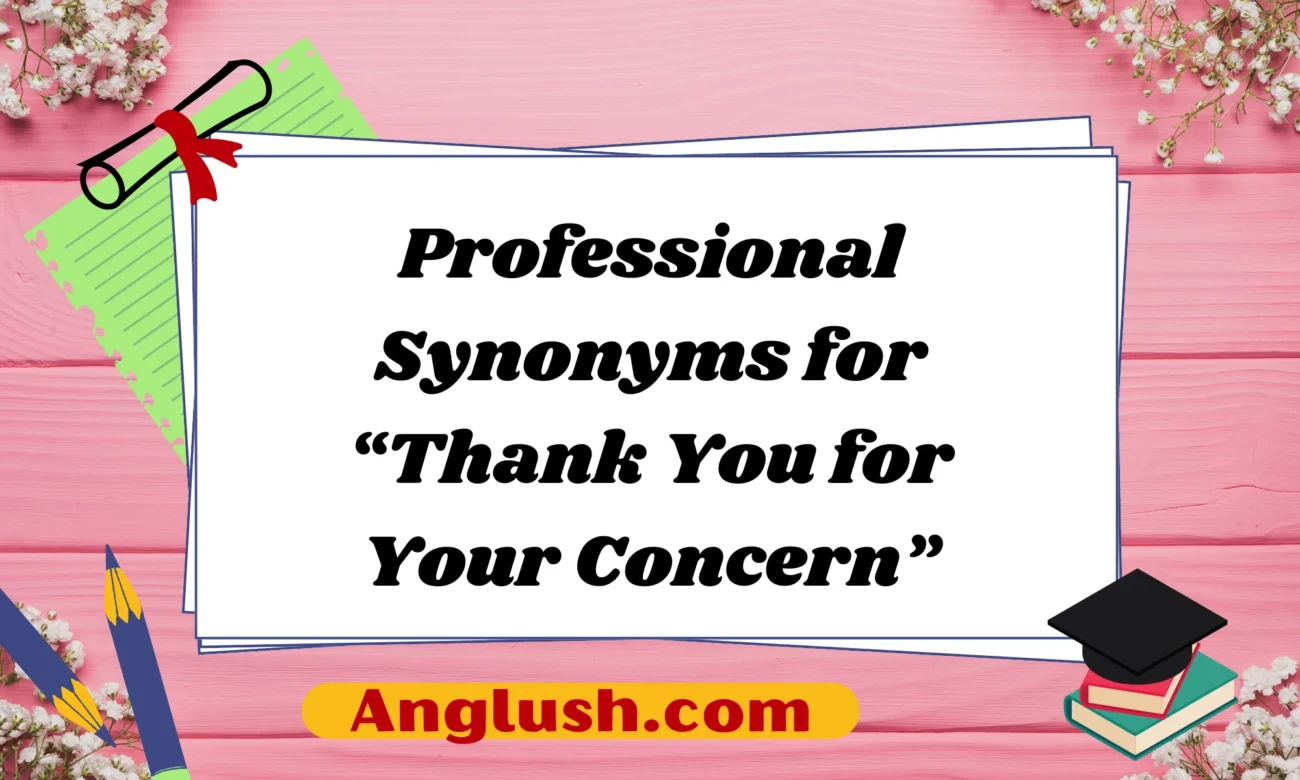Introduction
Expressing gratitude for someone’s concern or care is an essential part of effective communication, especially in professional and social settings. While “Thank you for your concern” is a common phrase, there are many alternative ways to express appreciation with varying degrees of formality, warmth, and professionalism.
This article provides more than 28 professional synonyms for “Thank you for your concern,” categorized by tone and context. Whether you are responding in a formal email, a casual text, or a professional setting, this guide will help you find the perfect expression.
Why Should You Use Alternatives to “Thank You for Your Concern”?
Using different phrases can help you:
✅ Match the Tone of the Conversation – Whether you are in a professional or personal setting, the right phrase ensures clarity and warmth.
✅ Sound More Natural – Some alternatives feel more engaging and less robotic.
✅ Showcase Emotional Depth – Different expressions can convey varying levels of appreciation and sincerity.
Now, let’s explore the best synonyms and alternatives!
Professional Alternatives to “Thank You for Your Concern”
These alternatives work best in formal emails, workplace settings, and business communications.
1. I Appreciate Your Concern
✔ Best for: Professional emails, workplace responses
✔ Example: I truly appreciate your concern and support during this time.
2. I’m Grateful for Your Thoughtfulness
✔ Best for: Business letters, professional conversations
✔ Example: I’m grateful for your thoughtfulness regarding my recent situation.
3. Your Concern is Deeply Appreciated
✔ Best for: Corporate settings, client interactions
✔ Example: Your concern is deeply appreciated, and I sincerely thank you for reaching out.
4. Thank You for Your Thoughtful Words
✔ Best for: Responding to colleagues, professional associates
✔ Example: Thank you for your thoughtful words; they mean a lot to me.
5. I Appreciate Your Kindness and Support
✔ Best for: Emails to supervisors, professional well-wishers
✔ Example: I appreciate your kindness and support during this challenging period.
Casual Alternatives for “Thank You for Your Concern”
These options are more relaxed and work well in informal settings, friendly messages, or social conversations.
6. Thanks for Checking In
✔ Best for: Casual workplace emails, friends, or acquaintances
✔ Example: Thanks for checking in! I really appreciate it.
7. I Really Appreciate That
✔ Best for: Text messages, informal chats
✔ Example: I really appreciate that. It means a lot!
8. Thanks for Thinking of Me
✔ Best for: Social media responses, casual texting
✔ Example: Thanks for thinking of me! You’re so kind.
9. That Means a Lot, Thanks!
✔ Best for: Friendly conversations, personal chats
✔ Example: That means a lot, thanks! I truly appreciate it.
10. Thanks, I Appreciate It
✔ Best for: Everyday conversations, coworkers, acquaintances
✔ Example: Thanks, I appreciate it! I’m doing much better now.
Polite and Warm Alternatives to “Thank You for Your Concern”
If you want to show warmth and gratitude while maintaining a balanced level of formality, these options are great choices.
11. Thank You for Your Kind Words
✔ Best for: Semi-formal messages, workplace exchanges
✔ Example: Thank you for your kind words; I truly appreciate your support.
12. I Appreciate Your Warm Wishes
✔ Best for: Responding to colleagues, networking interactions
✔ Example: I appreciate your warm wishes and encouragement.
13. I’m Touched by Your Concern
✔ Best for: Close colleagues, acquaintances, thoughtful responses
✔ Example: I’m touched by your concern. It really means a lot to me.
14. Thank You for Being So Thoughtful
✔ Best for: Friendly professional settings, social conversations
✔ Example: Thank you for being so thoughtful! Your support is truly appreciated.
Empathetic Alternatives for “Thank You for Your Concern”
These alternatives work well when you want to express gratitude while acknowledging a person’s kindness and empathy.
15. I Sincerely Appreciate Your Compassion
✔ Best for: Professional and personal conversations with a deeper tone
✔ Example: I sincerely appreciate your compassion and understanding.
16. Your Kindness Means So Much
✔ Best for: Personal messages, heartfelt responses
✔ Example: Your kindness means so much. Thank you for thinking of me.
17. I Truly Value Your Support
✔ Best for: Business settings, work emails, formal thank-you messages
✔ Example: I truly value your support and kind words during this time.
18. I’m Grateful for Your Supportive Words
✔ Best for: Networking events, appreciation emails
✔ Example: I’m grateful for your supportive words. Thank you!
13 Texting Examples for “Thank You for Your Concern”
Here are text-friendly ways to express appreciation:
- “Thanks for checking in! That means a lot.”
- “I really appreciate your kindness. Thank you!”
- “Your support truly means the world to me. Thank you!”
- “I appreciate your thoughtfulness so much. Thanks!”
- “Thanks for thinking of me. That’s so kind!”
- “I sincerely appreciate your concern. It means a lot.”
- “That was so thoughtful of you—thank you!”
- “Your kindness is so appreciated. Thanks again!”
- “I value your concern and support. Thank you!”
- “I appreciate you checking in on me—means a lot!”
- “Your concern truly warms my heart. Thanks a lot!”
- “It’s so nice of you to think of me. Thanks so much!”
- “Thanks a ton for your thoughtful message!”
How to Choose the Best Alternative
Choosing the right phrase depends on:
✔ The Relationship – A professional email requires a more formal tone, while a text to a friend can be more casual.
✔ The Context – If you are responding to a kind message about a difficult time, opt for a warm and heartfelt response.
✔ The Medium – Emails should be more structured, while texts can be brief and casual.
Conclusion
Finding the right way to say “Thank you for your concern” can help you communicate appreciation effectively. Whether you’re writing a professional email, responding to a friend’s text, or engaging in a heartfelt conversation, there are plenty of thoughtful alternatives to use.
By choosing the right phrase, you can make your response feel more personal, genuine, and appropriate for the situation.

